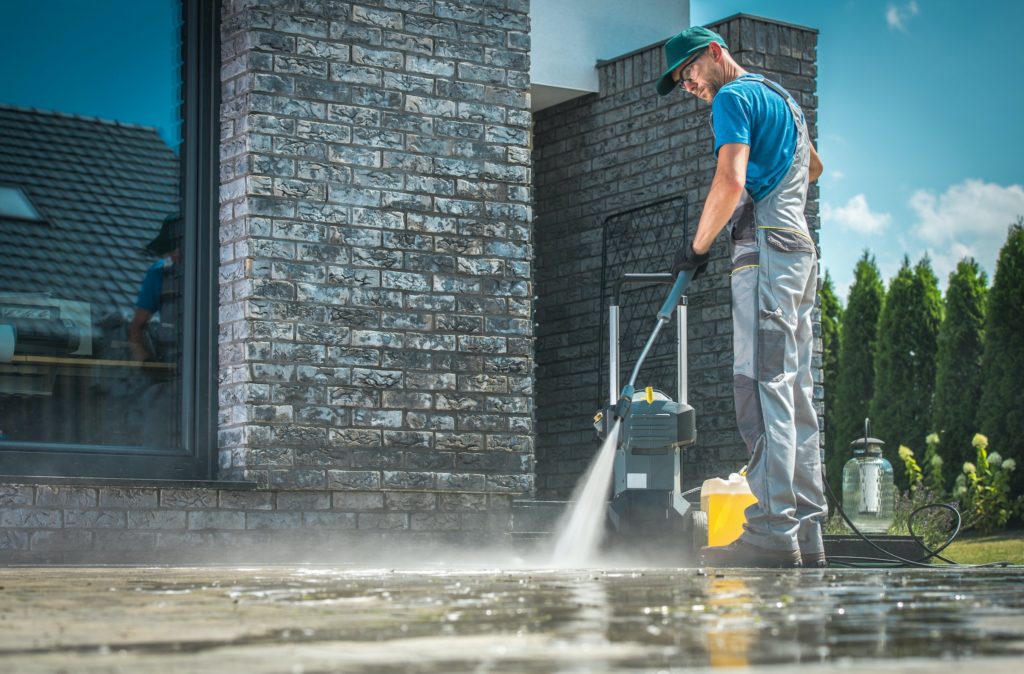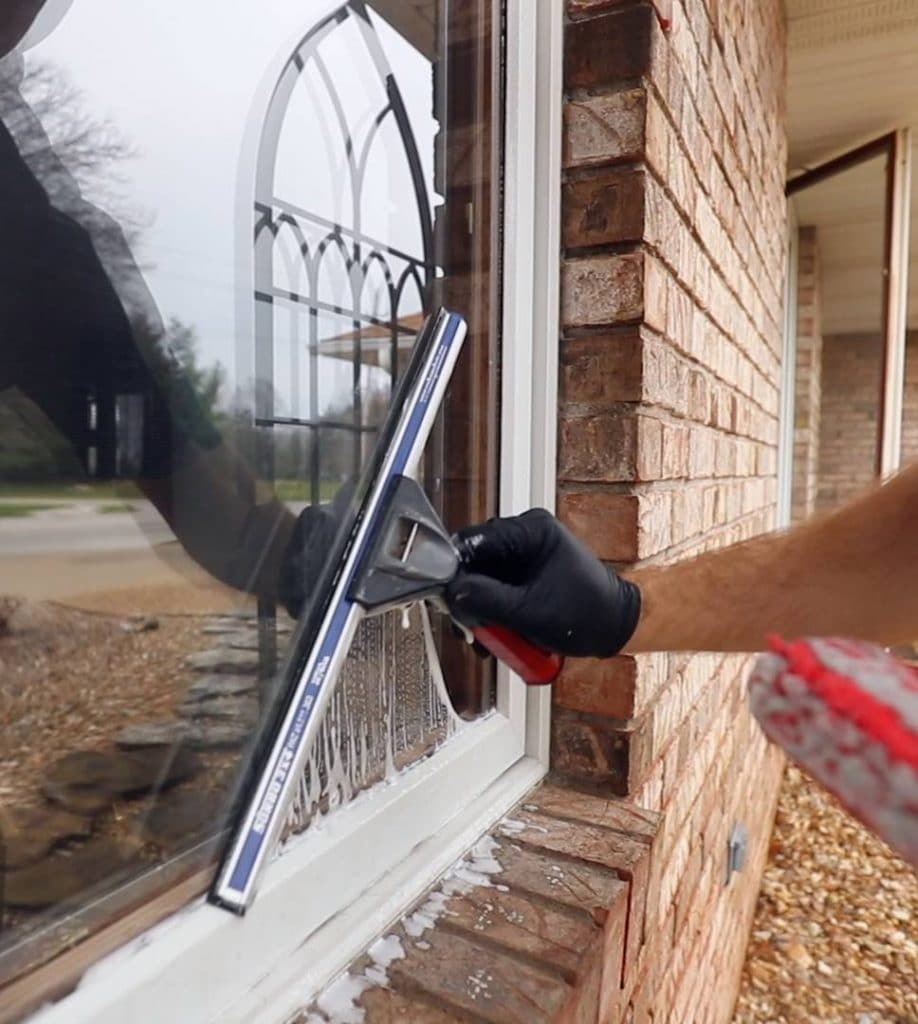
THE ENVIRONMENTAL IMPACT OF PRESSURE WASHING
In the age of urbanization, where sleek skyscrapers meet humble homes, maintaining the beauty and hygiene of our structures becomes paramount. Pressure washing is a favorite technique, offering a transformative cleanse for various surfaces. However, an ecological footprint is left behind with every powerful squirt of water. Through the lens of Excellent Power Wash, let’s delve into the intricate dance between the allure of cleanliness and the imperative of environmental responsibility.

Introduction: Understanding Pressure Washing
Nestled in the dynamic landscape of Goodyear, Arizona, lies the intersection of innovation, service, and environmental responsibility. With its unwavering commitment to excellence, this is where Excellent Power Wash Pro Services has made its mark for over two decades. As the cityscape changes and evolves, so does our need to maintain it. Pressure-washing has become a trusted method for homeowners and businesses to breathe new life into their properties. Yet, with its rise in popularity, a pertinent question emerges: What is this cleaning method’s environmental cost? To answer this, let’s delve into the world of pressure-washing.
Overview of Pressure Washing
How Does Pressure Washing Work?
Pressure washing, or power washing, involves high-pressure water spray to remove dirt, mold, grime, and other contaminants from surfaces. This technique utilizes a machine that pumps water at a high speed, which, when directed at a surface, can lift and wash away even the most stubborn of stains.
Common Uses for Pressure Washing
For a homeowner, especially in the Phoenix area, pressure washing offers a range of applications. From cleaning the exterior walls of your house, rejuvenating the sidewalk, and sprucing up the driveway to restoring the luster of decks and fences, the power of pressurized water proves to be a versatile tool. At Excellent Power Wash Pro Services, our technicians frequently deploy pressure washing to tackle these common challenges, ensuring that homes look their best and are free from potentially damaging and health-compromising elements like mold and algae.
Environmental Impacts of Pressure Washing
The Water Footprint of Pressure Washing
Water conservation remains a pivotal concern in our current age, with regions worldwide grappling with diminishing water resources. If not managed judiciously, pressure washing can consume vast amounts of water. For instance, a standard pressure washing session can use up to several gallons of water per minute. Multiply that by the duration of a cleaning job, and you can quickly see how the numbers add up.
Impact of Cleaning Solutions on Ecosystems
Many pressure-washing tasks, particularly those that aim to remove stubborn stains or biological growths, often rely on cleaning solutions. While these agents can significantly boost the effectiveness of the washing process, some may contain chemicals that, when washed into local waterways, can harm aquatic life and disrupt the balance of ecosystems.
Noise Pollution from Pressure Washing
The environmental impact isn’t solely about natural ecosystems but also the human environment. Pressure washers can be loud. Their noise can disrupt local communities, mainly if used for extended periods or during inappropriate times.
Impact on Local Fauna
The immediate area where pressure-washing occurs can be a habitat for various creatures, ranging from insects to small mammals. The forceful water stream and chemicals may harm these animals or disrupt their habitats.
Evaluating Pressure Washing Techniques
Traditional Pressure Washing: A Closer Look
Traditional pressure washing focuses primarily on achieving the best cleaning results, sometimes without thorough consideration of environmental impacts. This method can lead to excessive water usage and the deployment of potent chemical agents.
Environment-friendly Alternatives: Soft Washing and Eco-Washing
Evolving with the environment’s needs, soft washing, and eco-washing have emerged as sustainable alternatives. Soft washing uses lower pressures and relies on eco-friendly cleaning agents, reducing potential harm to surrounding fauna and flora. Eco-washing, on the other hand, prioritizes environmentally friendly practices at every stage, from water conservation to the selection of biodegradable cleaning solutions.
Environmental Guidelines and Regulations for Pressure Washing
Local Laws on Pressure Washing
Pressure washing, while effective, can come under the scrutiny of local regulations, especially in regions keen on conserving water and protecting their local ecosystems. In places like Verrado and its surrounding areas, homeowners might encounter stipulations about the amount of water used, when pressure washing is permissible, or the disposal of wastewater. Homeowners and businesses alike must familiarize themselves with these regulations to ensure they’re not only keeping their properties pristine but also abiding by the letter of the law.
Environmental Protection Agency (EPA) Regulations
The EPA has guidelines regarding the runoff from pressure washing activities, especially when hazardous cleaning agents are used. This runoff can enter storm drains, often leading directly to rivers, lakes, or oceans without treatment. To prevent contamination of these water bodies, the EPA might mandate certain businesses or homeowners to implement water recovery systems or use specific biodegradable cleaning agents. Adherence to these guidelines safeguards the environment and helps companies and homeowners avoid fines.
Strategies for Eco-Friendly Pressure Washing
At Excellent Power Wash Pro Services, our environmental commitment drives us to adopt greener strategies. We always pursue the latest technologies and methods to minimize our ecological footprint while delivering stellar results. Some of our approaches include:
-
- Water Reclamation: We can capture and reuse water by employing water recovery systems, drastically reducing waste.
-
- Eco-friendly Detergents: Opting for biodegradable and eco-friendly cleaning agents ensures we’re not introducing harmful chemicals into the environment.
-
- Optimized Techniques: Our technicians are trained to use the correct pressure and water flow, ensuring efficient cleaning with minimal resources.
Tips for Environmental-friendly Pressure Washing
Pressure washing is a powerful tool to maintain and rejuvenate our homes. Still, as we become increasingly aware of our environmental impact, we must ensure our cleaning practices reflect that awareness. Here are some more comprehensive tips to ensure your pressure washing is as eco-friendly as possible:
-
- Choose Safe Cleaning Agents:
-
- Look for detergents labeled as “biodegradable” or “eco-friendly.” These detergents break down more quickly and harmlessly in the environment.
-
- Avoid cleaning agents with phosphates, leading to algae blooms in local waterways.
-
- Natural alternatives like vinegar or citric acid can effectively clean surfaces and stains.
-
- Conserve Water:
-
- Use pressure washers with a pulse mode to intermittently shoot water, conserving its usage.
-
- Adjust the nozzle setting. A wider spray often covers more area with less water.
-
- Pre-soak the area with a light mist of water and detergent. This can make it easier to remove stains, reducing the cleaning time.
-
- Regular Maintenance for Efficiency:
-
- Clean and inspect filters, nozzles, and hoses regularly to ensure they work efficiently.
-
- Check for leaks in the equipment. Even minor leaks can lead to significant water wastage over time.
-
- Periodically inspect and replace worn-out parts, ensuring the machine operates efficiently.
-
- Control Runoff:
-
- Capture and redirect water runoff whenever possible to prevent it from entering storm drains.
-
- Using berms or containment mats can help in areas where runoff is particularly concerning.
-
- Wash in Sections:
-
- Break it down into sections instead of washing an entire area simultaneously. This allows you to control water usage better and ensures more effective cleaning.
-
- Educate Yourself and Others:
-
- Stay updated on the latest eco-friendly pressure wash techniques and products.
-
- If you’re hiring professionals, choose a company committed to eco-friendly practices, like Excellent Power Wash Pro Services.
-
- Share your knowledge with neighbors and the community. Collective efforts can lead to substantial environmental benefits.
-
- Be Mindful of the Time of Day:
-
- Washing during more excellent parts of the day (early morning or late afternoon) can reduce water evaporation, allowing you to make the most of the water you use.
-
- Opt for Modern, Efficient Equipment:
-
- Newer machines are often more water-efficient than older models. If you’re in the market for a new machine or hiring a service, ensure the equipment is up-to-date.
-
- Limit Frequency:
-
- While it’s essential to maintain cleanliness, sometimes pressure washing can be done less frequently. Regular light cleaning can prevent grime buildup, reducing the need for intensive pressure wash sessions.
-
- Reclaim and Recycle Water:
-
- Consider investing in water recovery systems. These systems capture, filter, and reuse water, significantly reducing wastage and protecting local waterways.
By integrating these eco-conscious strategies into your cleaning routine, you ensure a pristine home and play a vital role in safeguarding our planet’s future. It’s a win-win scenario, achievable with just a little awareness and effort.
Conclusion: Rethinking Our Cleaning Practices for the Environment’s Sake
As homeowners and businesses, it’s essential to recognize that our everyday choices, even seemingly minor ones like how we clean our exteriors, can profoundly impact the environment. While washing is undeniably an effective way to rejuvenate our homes and commercial spaces, it’s paramount to execute it responsibly.
The environment is a shared responsibility. As the residents of Avondale and its neighboring areas continue to enjoy the aesthetic and health benefits of clean homes, our collective duty is to ensure that our methods are sustainable. In this age of heightened environmental awareness, having a clean home or business front is insufficient. We must ensure that the cleanliness we enjoy today doesn’t come at the cost of our environment tomorrow.
Eco-friendly washing is more than just a buzzword—it’s a testament to the balance we can achieve between human needs and environmental responsibility. With the expertise of companies like Excellent Power Wash Pro Services, always at the forefront of blending efficiency with eco-consciousness, homeowners can rest easy knowing they’re making good choices for their homes and the planet.
FAQs
Why is water conservation important in pressure washing?
With regions globally facing water scarcity, conserving water during pressure washing ensures we stay on this precious resource. Reducing water usage also translates to cost savings for homeowners.
Are eco-friendly cleaning agents as effective as traditional chemicals?
Absolutely. Modern eco-friendly cleaning agents are designed to be both practical and environmentally friendly. They can tackle tough stains while ensuring minimal impact on the environment.
How can I ensure my pressure washing doesn’t disturb the local fauna?
Opt for soft washing or eco-washing methods that use gentler pressures and eco-friendly solutions. Also, schedule your washing sessions when local fauna is least active, like mid-morning.
Do I need a special permit for pressure washing in Phoenix?
Local regulations can vary, so it’s always a good idea to check with your municipality or local regulatory body before starting any extensive washing project.
What is the difference between soft washing and traditional pressure washing?
Soft washing uses lower pressures and often relies on biodegradable cleaning agents, making it gentler on surfaces and the environment. Traditional pressure washing can use higher pressures and might only sometimes incorporate eco-friendly practices.
In conclusion, our choices in maintaining our homes have broader implications. The future of pressure wash, with its potential environmental impacts in mind, lies in innovation, eco-consciousness, and a commitment to preserving our planet while meeting our immediate needs. As homeowners, service providers, or simply residents of this planet, it’s a responsibility we all share.




